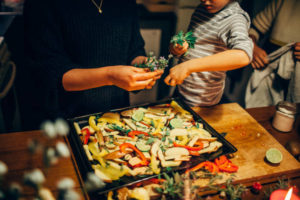4) From the Kitchen to the Compost Pile
 Compost holds a revered place in my family's history. One of my most treasured possessions is my great-great grandfather's copy of Der Schweizer Bauer (The Swiss Farmer) from 1859, in which compost is discussed in great detail. My dad was even featured in my hometown newspaper one time for the compost bins he built. I have been trying to garden in Colorado for years now, and let me tell you, it is HARD. Soil amendment is an absolute must, and it's expensive to purchase.
Compost holds a revered place in my family's history. One of my most treasured possessions is my great-great grandfather's copy of Der Schweizer Bauer (The Swiss Farmer) from 1859, in which compost is discussed in great detail. My dad was even featured in my hometown newspaper one time for the compost bins he built. I have been trying to garden in Colorado for years now, and let me tell you, it is HARD. Soil amendment is an absolute must, and it's expensive to purchase.
With the renewed emphasis on cooking at home and gardening that we've seen in 2020, it just makes sense to pair that with home composting, especially as we prepare our sumptuous holiday meals. It is estimated that in the U.S., 30-40% of food is wasted. I find that figure staggering for a number of reasons, and so this is one area in which I am resolved to do my part. I've committed to taking up the family baton and redoubling my efforts at composting. When composting:
- Do put things like fruit and vegetable trimmings, spoiled produce, egg shells and coffee grounds in a contained area of your yard, and layer with leaves, grass clippings, etc. Ideally, it
- Don't put things like meat scraps, bones, oil, or dairy in your compost bin or turner.
- Do aerate (stir) your compost once in awhile and keep it moist, even in cold weather.
- Don't hesitate because you think it will smell bad. If it does, you're doing something wrong.
- Do check your fridge and pantry for old produce and compost it BEFORE grocery shopping. This will not only cut down on contact spoilage, but also raise your awareness about what you're wasting.